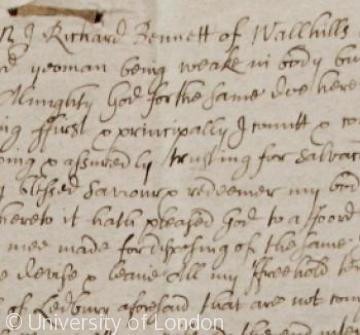Probate Material
 Extract of the will of Richard Bennett of Wall Hills, Lebury who died in 1693
Extract of the will of Richard Bennett of Wall Hills, Lebury who died in 1693Some of the most rewarding personal documents available to historians are the will and the probate inventory.
The written will is familiar today but in the past spoken or nuncupative wills were acceptable. Before the 19th century wills were seldom made until the testator was in danger of death and they contain often moving statements of faith as well as expressions of love and concern for family members. Although the wealthy desired to pass on their land and money many poorer people showed as much concern for the bestowing of their cooking pans and their best clothes.
The saleable goods of the testator had to be valued for probate and the resulting inventories can tell us a great deal about the deceased. Few records are as revealing of domestic life especially for the 16th to 18th centuries. Urban inventories often go into great details about trade tools and shop stock as well as room by room lists of furniture and furnishings. The fashions of the day and the interests and tastes of the deceased and family members are revealed in items such as musical instruments, pictures, pots of flowers, embroidered cushions and china. The contents of the kitchen provide a fascinating insight into cookery. High class inns often have some of the most interesting inventories from named bedchambers with details of the colours and pattern of the bed hangings to the number of chamberpots and candlesticks and the contents of the linen cupboards. Rural inventories usually concentrate on crops and livestock.
Other probate material may be no less interesting. Letters of administration may shed light on relationships or problems over the estate of the deceased especially where several letters were granted over a long period. The church courts and later the High Court have often had to deal with disputes over wills. The written depositions used by church and university courts often begin with short biographies of the witness and may be very revealing about the circumstances of death, family relationships, property and even personality of the deceased.










